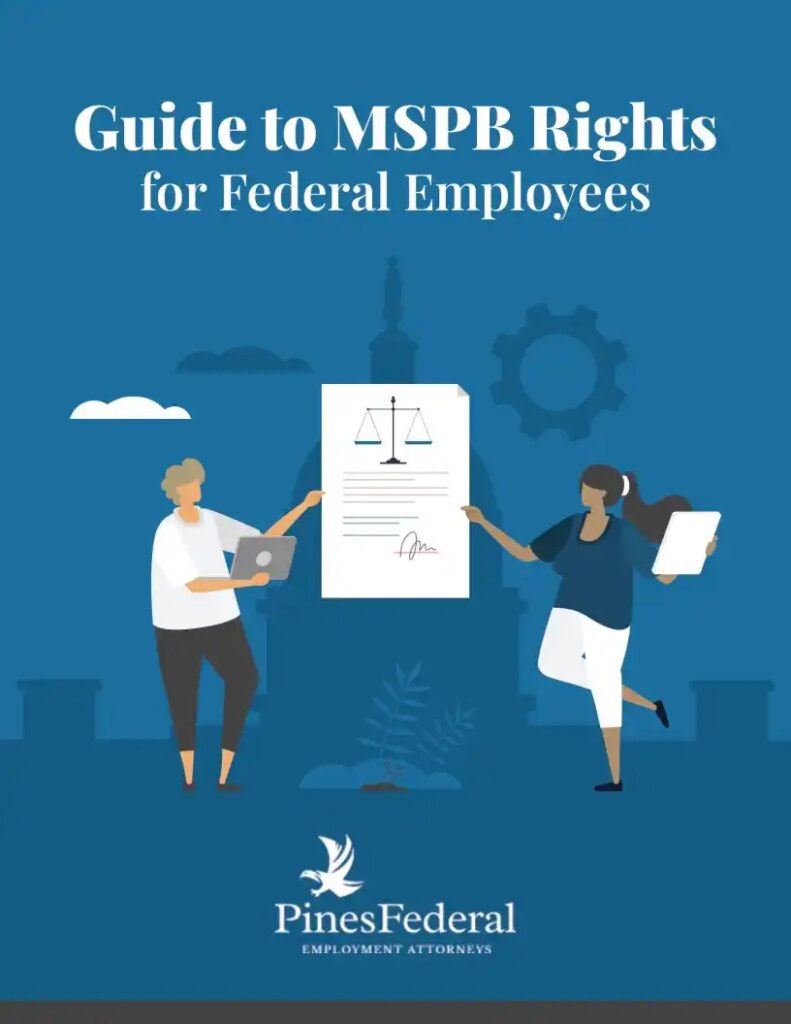
Suspension without pay—often reserved for serious infractions such as sexual harassment, violence, or pending criminal legal matters—is one type of action federal employers can take to discipline employees.
But just how long can an employer suspend you without pay?
While a suspension’s duration may range from a fixed to an indefinite period, the length typically depends on your offense and whether you are an “exempt” or “non-exempt” employee.
If you are a federal employee currently experiencing a suspension, it’s important to remember that you have legal rights and options.
At Pines Federal, we have over 60 years of combined experience in federal employee law and will put it to work for you. As skilled MSPB attorneys, we can answer your questions, review your claim, and explore your options, taking the necessary steps to address your situation constructively.
Contact us online or call (800) 801-0598 today, then keep reading to learn more about how long you can be suspended from work without pay and your rights in different suspension scenarios.
What Is a Suspension Without Pay?
A suspension is when an employer temporarily places an employee in non-working status. While in non-working status, the employee is considered off-duty and does not receive wages. Suspensions are generally used as a disciplinary measure and can be temporary or indefinite, depending on the seriousness of the offense or reason for taking action.
How Long Can an Employer Suspend You Without Pay?
The Fair Labor and Standards Act (FLSA) is the primary law covering pay for federal employees. Under the FLSA, employees are “exempt” or “non-exempt.” How suspension affects pay depends on the reason for the suspension and your employee classification.
Non-Exempt Employees
Generally, federal employers can suspend “non-exempt” employees under (2) 5 U.S.C. § 7513 for performance issues or conduct that harms service efficiency. There are three suspension periods without pay under (2) 5 U.S.C. § 7513, and procedural standards for each differ. Let’s review all three scenarios.
14 Days or Less
When an agency suspends an employee for 14 days or less, the employee has certain rights provided by statute and Office of Personnel Management (OPM) regulations, as well as Collective Bargaining Agreements for bargaining unit employees (BUE’s), including:
- Written notice stating the specific reasons for the proposed action and the right to review the material the employer is relying on;
- Reasonable time to answer orally and in writing and to furnish documentary evidence in support of the answer in not less than 24 hours;
- A written decision and the specific reasons for the suspension as soon as possible, along with any notification of grievance rights; and
- Legal representation.
If you’ve been suspended without pay for 14 days or less, a skilled advocate at Pines Federal can explain your rights. Our attorneys can also review your employer’s actions to determine whether they are justified or constitute a wrongful suspension without pay.
If you are a BUE member of a labor union like AFGE, NFFE, or NTEU, our legal team can help you file a grievance. We have 25 years of experience dealing with federal labor unions.
More Than 14 Days
If the infraction is severe, for example, sexual harassment or assault, an employer may suspend an employee without pay for more than 14 days.
Employees suspended for more than 14 days are entitled to:
- Unless there is reasonable cause to believe the employee committed a crime punishable by imprisonment, at least 30 days advance written notice with the specific reasons for the proposed action;
- Active-duty status in their regular position during the advance notice period;
- A reasonable time of not less than seven days to answer and furnish evidence in support of the answer;
- If the employee is still working, reasonable time to review the material the employer relied on to support its proposed action, to prepare an answer orally and in writing, and to secure affidavits; and
- Legal representation.
As with shorter suspensions, the employer must also provide the employee with a written decision as soon as practicable and give notice of any appeal or grievance rights.
Indefinite Suspensions
Employees may be suspended without pay, pending investigation, indefinitely for limited reasons.
These are:
- When an employer has reasonable cause to believe that an employee committed a crime that could result in imprisonment,
- When the employer has legitimate concerns that an employee’s medical condition makes his continued presence in the workplace dangerous or inappropriate, and
- When an employer suspends an employee’s access to classified information, and the employee needs such access to perform their duties.
Employees placed on indefinite suspension should review 5 C.F.R. § 752.404, “Procedures,” or contact Pines Federal to learn more about their rights.


“I have never been involved in a court case before and was scared to make even the first phone call to seek legal counsel. I found Pines Federal after reviewing several offices…My case was settled to my satisfaction and I can’t recommend this practice enough…”
Exempt Employees
Federal employees covered by the FLSA are “non-exempt” unless they fall into a specific exemption under 5 C.F.R. § 551.202(b).
These include:
- Executive exemption—employees who supervise two or more employees and participate in decisions like discipline or hiring;
- Professional exemption—such as doctors, lawyers, accountants, architects, scientists, and others;
- Administrative exemption—individuals whose work contributes to the running of a federal agency and who have discretion as to essential matters; and
- Computer worker exemption—individuals such as computer programmers and software engineers, i.e., highly skilled employees involved in developing hardware or software systems, systems analysis, and similar tasks.
If done in good faith, employers may suspend an exempt employer without pay if they violate workplace conduct rules. However, a suspension without pay is only appropriate when related to severe misconduct such as sexual harassment, workplace violence, drug or alcohol use, or for violations of state or federal laws, and not for performance or attendance issues. In this case, an employer may suspend an exempt employee for one or more days and only in full-day increments.
Contact Our Experienced Federal Employment Suspension Lawyers
Are you a federal employee facing suspension without pay? You deserve a team that truly understands the ins and outs of federal employment law. Our experienced attorneys serve federal employees exclusively. We’ve built a reputation as trusted advocates who work tirelessly for your rights.
With Pines Federal, you’re not just hiring an attorney but gaining powerful allies with a superb Avvo rating and recognition as Super Lawyers by Thomson Reuters, among other numerous accolades. Don’t face your suspension alone.
Contact our legal team online or call (800) 801-0598 today for a consultation, and let us fight for a fair resolution.
[DOWNLOAD] MSPB Rights for Federal Employees
